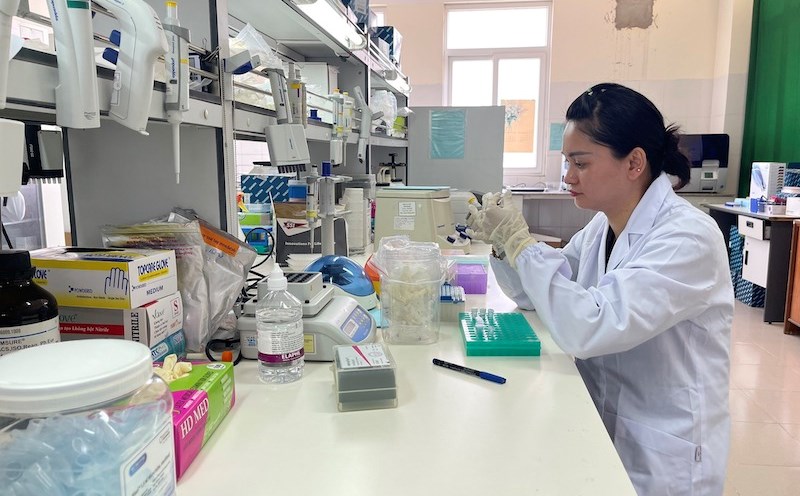Resolution No. 72-NQ/TW of the Politburo sets a goal of improving the physical strength, intelligence, stature and healthy life of the people by 2030.
By 2030, the average height of children and adolescents aged 1 - 18 will increase by at least 1.5 cm; the average life expectancy will reach 75.5 years, of which the number of years of healthy living will reach at least 68. Reduce the burden of disease and control risk factors affecting health...
People have access to quality health services, aiming for comprehensive health care. From 2026, people will have regular health check-ups or free screening at least once a year, and an electronic health book will be established to manage their health through the life cycle, gradually reducing the burden of medical costs. By 2030, people will be exempted from hospital fees at a basic level within the scope of health insurance benefits according to the roadmap...
Vision to 2045, strive for a good quality living environment; health indicators of the people, coverage of essential health care services are on par with developed countries in the region and the world. People have an average life expectancy of over 80 years, in which the number of years of healthy living increases to over 71 years, the average stature, physical strength, and height of young people are equivalent to countries with the same level of development. The modern, fair, effective and sustainable health system, taking disease prevention as the top priority, meets the increasingly high and diverse health care needs of the people.
Reforming health finance and effectively and sustainably developing health insurance policies
The Resolution sets out many tasks and solutions, emphasizing the need to strongly innovate thinking and action in leadership, direction, organization of the implementation of the work of protecting, caring for and improving people's health.
To move towards the goal of exempting hospital fees for all people, the Resolution clearly states the need to promote health finance reform and effectively and sustainably develop health insurance policies.
The state budget ensures spending tasks to meet the basic and essential requirements of protecting, caring for and improving people's health, playing a leading role in ensuring finance, investing in facilities and medical equipment for grassroots health, preventive medicine, health care for people subject to social policies, some specific subjects and in areas of ethnic minority areas, mountainous areas, areas with difficult socio-economic conditions, especially difficult, border areas, islands, mental health, forensic medicine, forensic psychiatric care, emergency resuscitation, pathology and some specific subjects.
Prioritize the arrangement and assurance of annual increases in state budget expenditures for people's health care in accordance with requirements and tasks. The state budget ensures regular expenditure funds and investment in grassroots health care and preventive medicine. Have a suitable financial mechanism to mobilize all social resources to invest in the field of public health services.
Implement regular health check-ups or free screening visits for people at least once a year according to target groups and priority routes.
From 2026, coordinate between periodic health check-ups, free screening, health checks of students, occupational health check-ups, health check-ups for workers according to regulations and health insurance examinations and treatments to provide free health check-ups and complete the creation of electronic health books for all people. Have appropriate support policies for the cost of transporting out-of-hospital emergency care for some social policy beneficiaries.
Gradually implement the policy of hospital fees exemption, first of all for social policy beneficiaries, disadvantaged people, low-income people and some other beneficiaries within the scope of health insurance benefits according to the roadmap.
From 2026, gradually increase the rate, payment and expenditure for disease prevention, early diagnosis and treatment of a number of diseases and priority subjects according to the roadmap from the Health Insurance Fund to reduce the financial burden on patients, in line with the increase in health insurance contributions according to the provisions of law from 2027.
The state budget and the health insurance fund pay for a number of diseases of disease prevention, management of chronic diseases, periodic health check-ups and screening according to professional requirements at the initial level of medical examination and treatment, basically according to the appropriate roadmap.
Improve the efficiency of management, sustainably use the Health Insurance Fund, reform administrative procedures, save management costs, increase spending on medical examination and treatment.
Piloting and diversifying additional health insurance and health insurance packages according to people's needs, linking health insurance with health insurance provided by insurance companies. Encourage the development of a variety of health insurance types.
Proactively mobilize forces, build a mechanism for coordination and coordination of medical human resources, ensure vaccines, reserves of drugs, supplies, and medical equipment, promptly meet requirements for disease prevention and control, emergency medical events, and ensure health security.











